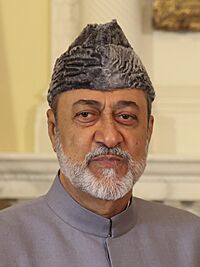List of rulers of Oman facts for kids
Quick facts for kids Sultan of Oman |
|
|---|---|
| سلطان عمان | |

Standard of the Sultan of Oman
|
|
| Incumbent | |
 |
|
| Haitham bin Tariq since 11 January 2020 |
|
| Details | |
| Style | His Majesty |
| Heir apparent | Theyazin bin Haitham |
| First monarch | Al-Julanda ibn Mas'ud (imamate) Ahmad bin Said (as sultan) |
| Formation | 751 (imamate) 1744 (Busaid dynasty) |
| Residence | Al Alam Palace Al Baraka Palace |
| Website | |
The Sultan of Oman is the most powerful leader in the country. This person is both the head of state (like a president or king) and the head of government (like a prime minister). Oman is an absolute monarchy, which means the Sultan has full power.
The sultans of Oman belong to the Al Bu Said dynasty. This family has been in charge of Oman since the mid-1700s. The current Sultan is Haitham bin Tariq, who became Sultan on January 11, 2020. Before Oman became the Sultanate we know today in 1970, it was ruled by different groups, including the Sultanate of Muscat and Oman, the Omani Empire, and the Imamate of Oman, going all the way back to 749.
Contents
Oman's Early Leaders: The Imams
For many centuries, Oman was led by rulers called Imams. These leaders were chosen by religious scholars and were seen as both political and spiritual guides. The first known Imam was Al-Julanda ibn Mas'ud, who began his rule around 749.
From Imams to Dynasties
After the early Imams, Oman was ruled by different families, or dynasties. One important dynasty was the Nabhani dynasty, which ruled from 1406 to 1624. During this time, the Portuguese had some control over parts of Oman.
Another powerful family was the Yarubi dynasty, which took over in 1624. They were very important because they managed to kick out the Portuguese in 1650. The Yarubi rulers helped Oman become a strong trading power, especially in the Indian Ocean. They built many forts and expanded Oman's influence. This dynasty ruled until 1749.
The Sultans of Oman: The Al Bu Said Family
Since 1749, Oman has been ruled by the Al Bu Said dynasty, with their leader known as the Sultan. This family has guided Oman through many changes, from a large empire to the modern country it is today.
Ahmad bin Said: The First Sultan
The first Sultan from the Al Bu Said family was Ahmad bin Said al-Busaidi. He started ruling in the coastal areas in 1744 and became the official Sultan of all Oman in 1749. He was a strong leader who helped unite the country and protect it from invaders.
Important Sultans Through History
Many sultans followed Ahmad bin Said. Some of the notable ones include:
- Said bin Sultan (ruled 1804–1856): He was a very important Sultan who moved the capital to Zanzibar (an island off the coast of East Africa) and made Oman a major trading empire.
- Qaboos bin Said (ruled 1970–2020): Sultan Qaboos is famous for transforming Oman into a modern nation. When he took power, Oman was very traditional. He used the country's oil wealth to build schools, hospitals, roads, and modern infrastructure. He also worked to keep peace in the region. He was greatly respected by his people and leaders around the world.
The Current Sultan: Haitham bin Tariq
The current Sultan is Haitham bin Tariq. He became Sultan on January 11, 2020, after the passing of Sultan Qaboos. Sultan Haitham is continuing the work of modernizing Oman and improving life for its people.
Who Becomes Sultan Next?
For a long time, the rules for who would become Sultan next were not always clear. However, on January 12, 2021, Sultan Haitham bin Tariq made an important change to Oman's basic law. He created the official position of Crown Prince of Oman.
This means that the Sultan's first son will now be the next in line to rule. Sultan Haitham appointed his son, Theyazin bin Haitham, as the first Crown Prince of Oman. This change makes the line of succession much clearer for the future.
See also
 In Spanish: Anexo:Sultanes de Omán para niños
In Spanish: Anexo:Sultanes de Omán para niños
 | Delilah Pierce |
 | Gordon Parks |
 | Augusta Savage |
 | Charles Ethan Porter |

